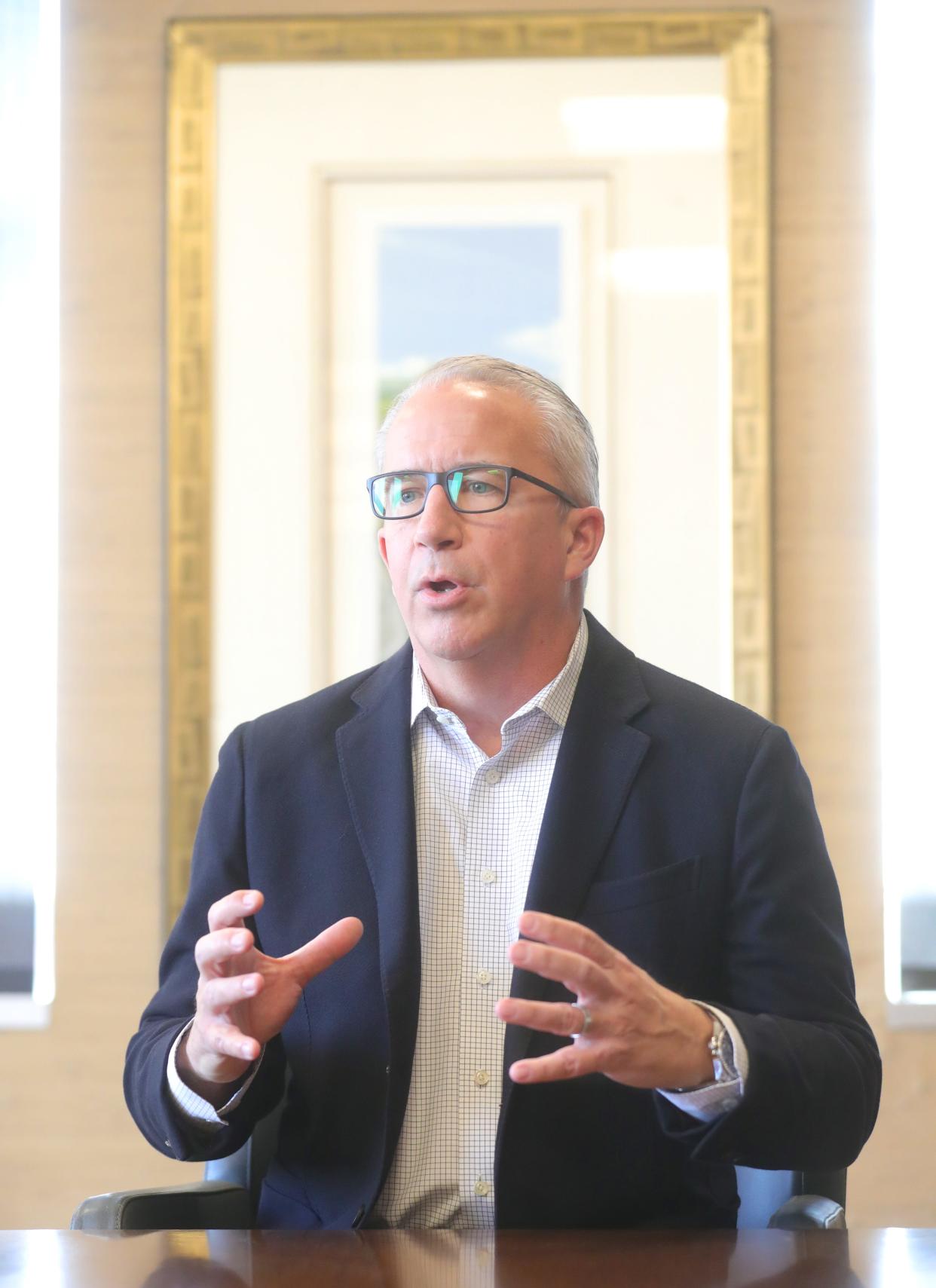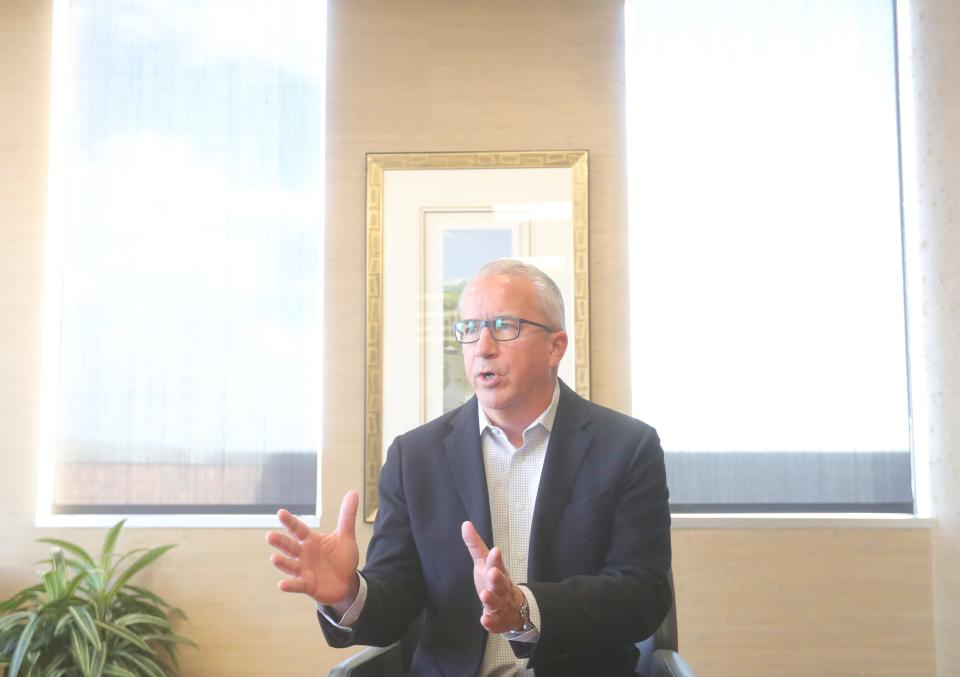FirstEnergy looks to future with sustainable energy, deals and stronger balance sheet

FirstEnergy Corp., working to put a major statewide scandal behind it, also continues working to keep the lights on in five states while making itself more attractive to stock and bond investors.
Chief Executive Officer Steven Strah says he is focused on moving the Akron utility forward, not just on the ongoing aftermath of the $61 million Larry Householder/House Bill 6 racketeering and bribery scandal.
More: FirstEnergy CEO: 'There were fundamental things that had to be corrected' after scandal
Strah, who was named acting chief executive officer in October 2020 and officially got the full-time gig in March, gave an interview last week to the Beacon Journal and talked about how FirstEnergy is evolving as a company as well as the ongoing investigations and review tied to the statewide scandal.
Akron return to office in 2022
He also said the utility continues to look at when its Akron employees can return to work in their downtown office building. Right now, the end of February looks to be the earliest opportunity, depending on what is going on with the COVID-19 pandemic. Strah said FirstEnergy, which has about 12,000 employees in five states, could end up with a hybrid office and remote work model.
Strah said he is spending the majority of his time on building a customer-friendly, five-state electric utility and rebuilding trust and confidence in the company in the eyes of its stakeholders.
Over this past year, Strah said he and others at FirstEnergy have been "doing the very hard work to do what's necessary to put the past behind us and clear a very bright and very fruitful path forward. And I think we've made great progress in doing that."
"We also have with FirstEnergy a very sustainable, very stable business plan," Strah said. "That business plan is built around now being a pure-play transmission and distribution company. That simplifies our business model and plays right into the core competency of the company and its employees."
Utility transmission lines transport electricity long distance from power plants, while distribution lines are for short distances, the kind of wiring that runs through neighborhoods.
$3.4 billion in 'transformative' deals
FirstEnergy in November announced what Strah said are two transformative actions:
• A 19.9% minority stake sale of its regulated transmission business, FET, to Brookfield for $2.4 billion in cash, with the deal expected to close next year.
• A $1 billion equity sale to Blackstone Group that also will result in Blackstone getting a seat on the FirstEnergy board.
"We believe the total $3.4 billion is really transformative for our company in a couple of different ways," Strah said. "Number one, it provides the opportunity for us to do a couple different capital investments, incrementally, on the [transmission and distribution] system. It also provides an excellent opportunity for us to strengthen our financial position."
FirstEnergy was not in a bad position prior to these actions, Strah said. But the company needed to strengthen itself financially, in particular related to its level of debt, he said. The infusions will strengthen the FirstEnergy balance sheet.
The Brookfield and Blackstone deals, coupled with the recent Ohio agreement to refund $306 million to state customers and the $230 million Department of Justice deferred prosecution agreement from earlier this year, help create certainty in the minds of FirstEnergy stakeholders, who include investors, Strah said.

$17 billion in spending to upgrade tech
FirstEnergy plans to use $2.2 billion out of the upcoming $3.4 billion to increase capital spending to $17 billion into 2025, with $10 billion targeted at sustainable energy investments.
FirstEnergy will be investing billions of dollars in upcoming years to make its transmission and distribution systems more reliable, Strah said.
Money will be spent on such things as providing 700,000 smart meters to customers and installing more than 200,000 so-called line circuits that will help reduce the impact of power outages, he said. Money will also be spent to help maintain line voltage within good bandwidths, he said.
FirstEnergy's goal is to become a carbon-neutral utility by 2050, Strah said. To do that, it is aligning itself with producers of solar, wind and other non-fossil fuel power providers in its five-state footprint.
Renewables seen as future power source
FirstEnergy is preparing for an energy transition away from natural gas and coal to renewable sources of power such as windfarms and solar, Strah said.
While FirstEnergy calls itself a pure-play regulated transmission and distribution company, its West Virginia subsidiary still owns two coal-fired power plants. The utility plans to keep the coal plants operating while working to make them cleaner, Strah said. The plants provide jobs and are an important part of West Virginia's economy, Strah said.
The company spun off its generation subsidiary, FirstEnergy Solutions, in a Chapter 11 bankruptcy filing. The subsidiary emerged out of bankruptcy proceedings in 2020 as Akron-based Energy Harbor.
Shortly after, FirstEnergy became embroiled in what is Ohio's largest bribery scandal, a scandal of its own making, tied to bribing officials to help create and pass House Bill 6 that provided more than $1 billion in subsidies to two former FirstEnergy nuclear plants now owned and operated by Energy Harbor.
Stock price recovering
FirstEnergy's stock price took a major hit from both the pandemic and the ongoing scandal investigations, wiping billions of dollars off the value of the company called market cap – the share price times number of shares.
The utility's stock price has bumped up in 2021 since Strah took on the role of CEO at the end of October 2020. The share price bottomed at $27.77 on Nov. 27, 2020, and on Friday closed at $38.84. Friday's closing price puts FirstEnergy's market cap at nearly $21.2 billion.
The company has performed well financially this year. In October, FirstEnergy reported a profit of $463 million on revenue of $3.1 billion for its third quarter, higher than a year ago and beating analyst expectations. It raised its financial guidance for the full year as well.
But the per-share price remains significantly below the pre-pandemic and Householder scandal peak of $52.23 in March 2020.
The scandal and drop in stock price helped pave the way for billionaire activist investor and corporate raider Carl Icahn to become one of FirstEnergy's largest shareholders and negotiate to place two representatives on the FirstEnergy board.
Strah said he has a good, productive and constructive relationship with the two board members associated with Icahn, who owns a nearly 3.5% stake in the utility with almost 19 million shares. That makes Icahn's investment firm FirstEnergy's fourth largest institutional shareholder, according to the latest available filings.
Community involvement remains
FirstEnergy will remain involved in its communities, including sponsorships, employee volunteers and corporate contributions, Strah said.
"All the other matters are out there and are real. We're dealing with them as we need to," Strah said. "Do I get updates from our legal team from time to time? Yes. I need to stay cognizant of our progress. But a majority of my job is to keep the company running and moving forward."
Over this past year, Strah said he and others at FirstEnergy have been "doing the very hard work to do what's necessary to put the past behind us and clear a very bright and very fruitful path forward. And I think we've made great progress in doing that."
Beacon Journal reporter Jim Mackinnon can be reached at 330-996-3544 or jmackinnon@thebeaconjournal.com. Follow him @JimMackinnonABJ on Twitter or www.facebook.com/JimMackinnonABJ.
This article originally appeared on Akron Beacon Journal: Akron-based FirstEnergy future involves deals, sustainable energy

